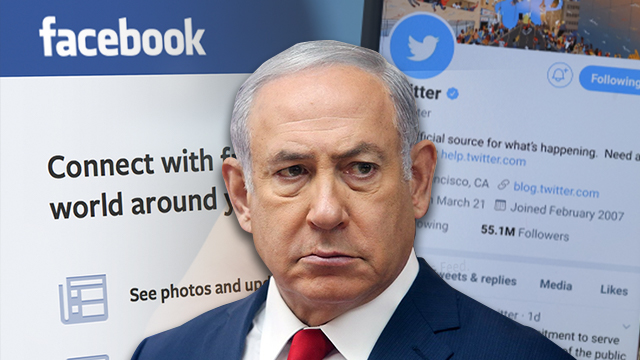
That was a surreal sight, since the so-called Captain George was suspected of being the man behind many fake profile disseminating pro-Netanyahu propaganda, writing some of the most aggressive and offensive posts on social media. Thus, in order to shake off the accusations of one disease, the prime minister shakes hands with another affliction - rudeness.
I looked at this man - his shy smile, his round glasses and his short-back-and-sides haircut - and was reminded of my uncle, of my neighbor and of a guy working at my post office. It was hard for me to imagine him sitting with his keyboard, armed with rage and poisonous cynicism, spouting curse words and hate speech all over the internet. He looked like your average “nice guy.”
Over the past 24 hours we have been trying to understand the social media jargon, in order to distinguish between a bot - a robot posing as a person - and fake news, characterized by someone setting up multiple user accounts, all spewing the same propaganda. To differentiate between those who are simply addicted to online debates and internet trolls who enjoy writing inciting comments just for the fun of it.
What’s spam and what’s genuine content? What’s an advertisement and what’s a sincere recommendation? The distinctions are barely noticeable, and the chase for the so-called truth - if it exists - is an exhausting, Sisyphean task. The new rules of modern day communication often result in cruel and puzzling situations.
A social network is a great blessing on the world. It gave a voice to the voiceless and destroyed the hierarchical pyramid, making every opinion equally important. Anyone can argue, express opinions or rebel against them. It gave way to popular wisdom that has tremendous value, creates authentic intimacy and a sense of community. In fact, for the first time in history, a person can be an active member of a specific community without belonging to it geographically.
That very technology, however, also alienates and isolates people. Keyboard warriors are only heroes in front of a keyboard. They don’t have a pair of eyes staring back at them, objecting to what they had said, and at the very best, there is a small profile picture to make eye contact with.
The alienation and isolation created by the screen, shows of bravado at the initial stage, and a veil of lies later on. Because if every voice is equal, and information can be distributed limitlessly, then you can’t really be sanctioned for spreading false accusations. The truth has no real power in the virtual world.
Half truths, near truth or complete lies are part and parcel of the daily social media discourse. The problem is that false information mischaracterizes people. Sometimes these profiles are run by actual people driven by ideological, political or commercial reasons, and sometimes it’s a product of bot farms.
Virtual reality may be perceived as apocalyptic, like a bad episode of the dystopian tech drama "Black Mirror". Humans without the humanity, a world in which facts and principles have no value. This fear is palpable because this slippery slope is being steadily reinforced by our politicians and leaders. And if they all have money on this horse, it's probably the winning one.
The truth, however, is that power is in our hands. Technology is always a blessing, and like every tool - you have to learn how to use it properly and create social norms defining what’s acceptable and what’s not. We must demand evidence and facts, and not to be tempted by gutter talk or cooperate with professional trolls. And we definitely mustn’t accept politicians who are using this tool for political interests.


















